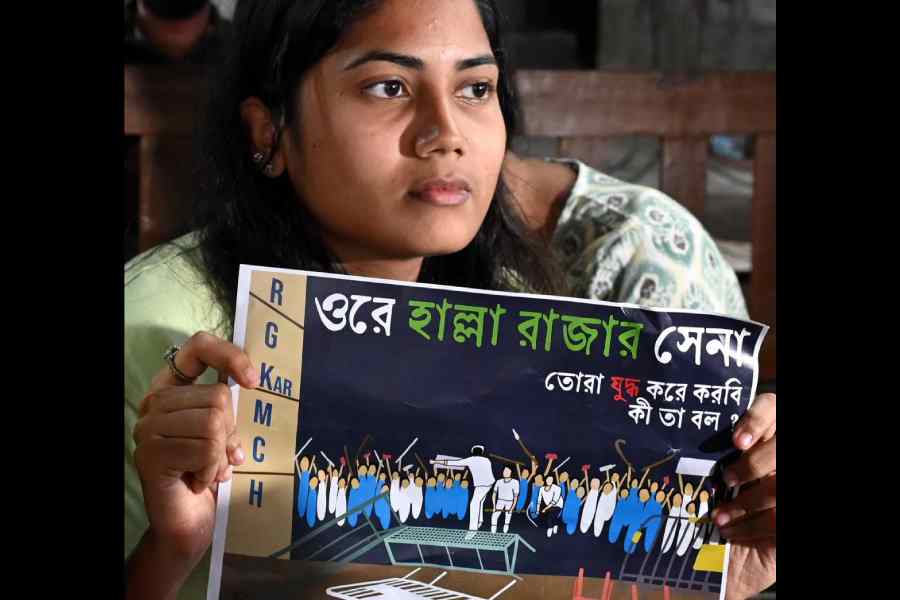Death deserves dignity. The demand for justice for the young RG Kar doctor continues, but viral posts on social media on her body and her person are stripping her of her dignity and subjecting her to the same violence again.
Post after post on social media and reports in mainstream media, often taking off from her post-mortem report, are scrutinising her body parts, including her genitalia, and the weight and the condition of these parts in detail.
“This is not only morally wrong, but also illegal,” said lawyer Kaushik Gupta, who has fought several human rights violation cases. “They violate her right to privacy, which is a fundamental right,” he added.
Law prohibits the naming or identification of a person who has been raped. According to Section 72 of the Bharatiya Nyaya Sanhita, anyone who prints or publishes the name or any other information that can reveal the identity of a person who has been subjected to “rape or sexual assault could be punished with imprisonment for up to two years and shall also be liable to fine”.
The section adds, “…where the victim is dead or a child or of unsound mind”, she can be identified only “with the authorisation in writing of, the next of kin of the victim”.
But law also prohibits any other discussion that denies her privacy, Gupta said. Her death is not a permission to discuss her; on the contrary.
Other than the name and photographs of the RG Kar doctor, shared widely on social media, including by government representatives and influencers, the details of the injuries on her body and the evidence of particular crimes done to particular parts of her body are being discussed in titillating detail again and again. “This is a re-enactment of the violence on her body,” said writer and activist Sarmistha Dutta Gupta.
Gupta cited the Constitution and Supreme Court judgments, stating all discussions that subject her body and person to such public scrutiny violate her right to privacy.
“The right to privacy is a fundamental right for Indian citizens under Article 21 of the Constitution,” he pointed out.
In 2017, a nine-judge Supreme Court bench had ruled in the case of Justice K.S. Puttaswamy (Retd) & Anr vs Union of India & Ors that the right to privacy is protected as an intrinsic part of the right to life and personal liberty under Article 21 and as a part of the freedoms guaranteed by Part III of the Constitution.
The right to privacy could be infringed only when there was a compelling state interest for doing so. This position places the right to privacy among other fundamental rights.
The right to privacy should protect the RG Kar doctor from the ongoing public discussion about her body parts, because the right continues after life, Gupta said.
He cited a judgment by the Supreme Court, delivered on January 19, 1995, that states that the right to dignity and fair treatment continues in death.
Hearing a petition in respect of the dead body of a condemned person who had been hanged, the apex court had ruled that the body should not remain suspended for half an hour after the execution and should be taken down as soon as the medical officer, present on the spot, declares him dead. The display of his body would rob the deceased person of his dignity.
“We must ask how the details of the post-mortem report are so easily available in the media,” Gupta said.
Gupta added: “As defence lawyers we struggle to get hold of a post-mortem report before the investigating agency files the report in final form.”
It is also time for us to ask ourselves why we are fixated on the body of a woman on which such violence was inflicted. “There is something violent within us,” Gupta said, “and any act of violence outside brings the violence within us to the forefront”.
“It is as if the body of the doctor is being torn to shreds again,” said former state women’s commission chairperson Sunanda Mukhopadhyay.
“The protests are important and must go on. But we have to understand where we are reproducing profoundly damaging patriarchal attitudes.”
An act of violence may unleash an outrage, and another violence, said mental health worker Ratnaboli Ray. “That outrage may not only drown the concerns about the affected individual, but also subject her to it again,” she said.
This is what is happening to the doctor who was sexually assaulted and murdered on August 9 at RG Kar hospital.
“The body of a woman is seen as titillating, even as a site of sexual violence, in its mutilated state,” Ray said.
This has disturbing mental health implications. “It can trigger trauma as well as violent sexual fantasies,” she said.
It has its roots in the innermost recesses of our psyche, because it is as old as patriarchy. “It is not the question of one institution, such as a hospital, though the medical establishment has always been deeply patriarchal. It is a question of the entire society.”
Dutta Gupta felt that the public display of the doctor’s body, and the details of the specific violence done to the female body parts being reported in the media, should be stopped immediately with the help of the law.
She recalled seeing a social media post of the doctor’s face, created from a photograph of her dead body. Dutta Gupta complained to the website about the post, which was being shared a lot, but no action was taken.
“Every time I read those details which strip the deceased woman of all privacy and dignity, I think of her grieving parents and how deeply painful it must be for them to have their daughter’s body repeatedly laid bare in public,” she added.











